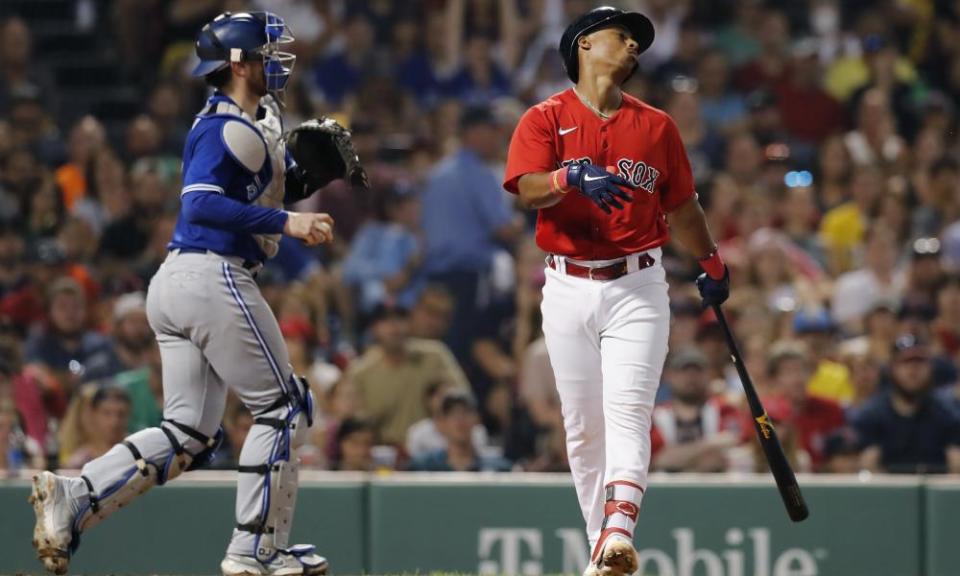Four games, 59 runs conceded: the Red Sox are in an impressive historic slump

Things have gotten so bleak in Red Sox Nation in recent days that Saturday afternoon’s 4-1 loss to the Toronto Blue Jays counted as a bright spot. Yes, Boston once again lost to an AL East opponent and fell further away from an increasingly unlikely playoff spot, but at least this time it wasn’t the most embarrassing regular season loss in franchise history.
It wasn’t just that the Red Sox did something they had never done before on Friday night, namely give up 28 runs in nine innings. No, it was the manner in which it happened. Their 28-5 loss to the Blue Jays was a clinic in how not to play baseball. It came complete with a starting pitcher getting knocked out early, an overworked bullpen failing to get outs and fielders brutally botching defensive plays.
Raimel Tapia INSIDE-THE-PARK GRAND SLAM! pic.twitter.com/7DQz5jlL2S
— Talkin’ Baseball (@TalkinBaseball_) July 23, 2022
The defining moment of the game and, barring a turnaround, the Red Sox’ season, came with the bases loaded in the third inning when Toronto’s Raimel Tapia hit what should have been an inning-ending flyball. Instead, outfielder Jarren Duran completely misjudged it, allowed the ball to drop and then inexplicably stood still for a moment while the Jays ran the bases. The result was one of the rarest of baseball oddities: an inside-the-park grand slam. That one inexplicable play gave Toronto a 10-0 lead and effectively ended any suspense left in the game.
However, there is no mercy rule in Major League Baseball, so the Red Sox had to keep throwing pitchers out there to toss batting practice to a relentless Toronto lineup. In their last two games before the All-Star break, the Red Sox lost to their old rivals the New York Yankees 14-1 and 13-2. By losing Friday’s game by such a wide margin, the Red Sox managed to put together the worst three-game run differential in MLB since 1900.
Dorktown: Red Sox! pic.twitter.com/Wz0hQfRQCb
— Secret Base (@secretbase) July 23, 2022
In mitigation, one of those losses to the Yankees was an impromptu bullpen game necessitated by starting pitcher Chris Sale suffering a freak hand injury after getting hit by a comebacker. Perhaps the Red Sox will take some comfort in that fact, but they probably shouldn’t. After Saturday’s comparatively drama-free loss, they have won just five of their last 19 games.
Boston’s July implosion is not some unforeseen event. Even when they were winning games earlier in the season, mostly against less formidable opponents, they had a knack of turning what should have been relatively painless victories into stressful nail-biters. Meanwhile, Boston have yet to win a series against anybody in their own division.
The 2 August MLB trade deadline is fast approaching and there is no way that they can contemplate being buyers. As of Sunday morning, they are just a half-game above the last-placed Baltimore Orioles in the AL East (and 16.5 behind the Yankee and while a playoff spot is within reach from a mathematical standpoint, the Sox have done little to suggest they deserve one.
Since John Henry bought the team in 2002, the Red Sox have rarely been sellers at the trade deadline. This could very well change shortly, particularly considering that Sale is potentially out for the season. Maybe, this time around, Henry and company will secretly be relieved to escape from the shackles of expectations.
Beyond their current collapse, Sox fans are worried that the team seems curiously uninterested in negotiating with two of their All-Stars: Xander Bogaerts, who can opt out after this season and Rafael Devers, who is signed until the end of the 2023 season. After the lingering emotional fallout from the indefensible Mookie Betts trade, there is a growing sense in New England that the team is simply not interested in paying either player’s next contract. The fact that chief baseball officer Chaim Bloom’s previous tour of duty was with the notoriously frugal Tampa Bay Rays has done nothing to calm these fears.
It was just last October that the Red Sox were facing the Houston Astros in the American League Championship Series, completing a wholly unexpected season-to-season turnaround. While most fans were still unhappy about losing Betts, who had just helped the Los Angeles Dodgers win a World Series, there was a palpable sense of renewal after the bleakness and bad vibes of 2020.
Now? The Red Sox have put together maybe the worst stretch in team history and the season is slipping away. Worse that that, they may part ways with their two best remaining homegrown hitters and start a self-inflicted extended rebuild.
It’s a sudden fall from grace, but not an unexpected one. Last year’s team overachieved – that’s what made it so fun for fans – but during the offseason, the Red Sox stood still as the rest of the division got better. A regression was to be expected, although no model could have predicted what we’ve seen in these last four games.
Ultimately, the Red Sox cannot honestly tell themselves that they are fully committed to winning. This starts with an ownership that has been content to coast on the fond memories of recent championships. That attitude has trickled down to the players, and it’s hard not to feel like this is a team ready to give up.

